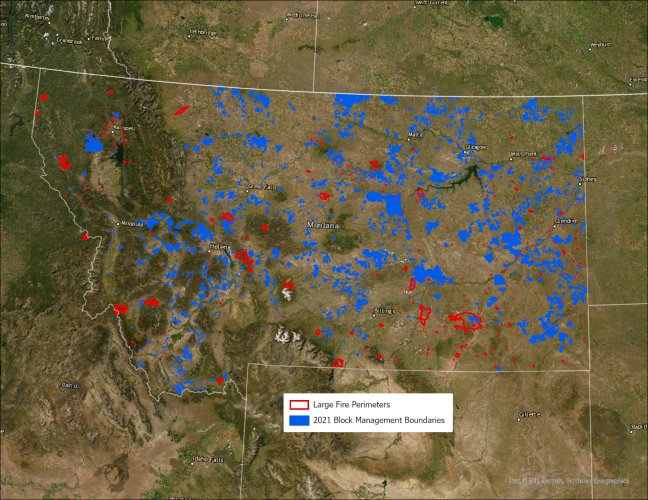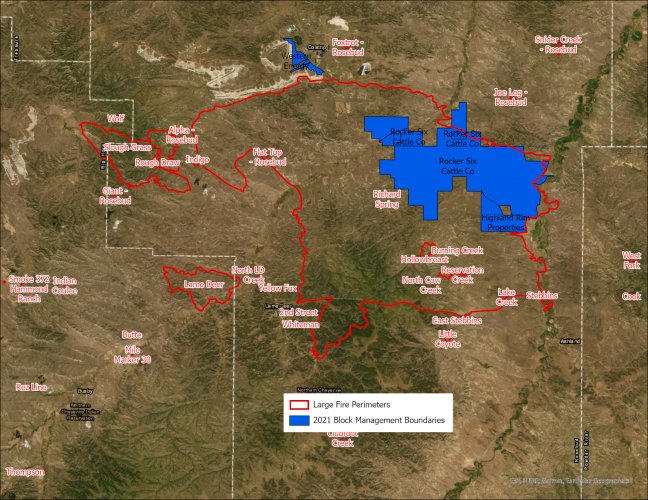HighCountryCommando
Active member
- Joined
- Jul 8, 2018
- Messages
- 107
First, this thread is for ideas only. It is not a thread for criticizing ideas, no matter how off base you think they are.
I will admit up front I'm a Montana NR hunter, so I'm not going to know the politics and nuance of the Block Management Program. I do love the program. I've harvested my deer the last two years on Type 1 BMAs, both times within sight of the landowner's residence. I found myself framing the farmhouse in the background of both the animals where they lay. It was very profound for me. Each time it presented me with a stark reminder of who provides the opportunity and how grateful I was for it. I wanted to go down and hug somebody and tell them how much I appreciate their generosity. I left a note instead.
Montana's BMA program represents the best private land access program anywhere in the world. I'm sure its got warts I'm unaware of but its potential seems to be far greater than its current state. From my perspective it seem to be underachieving. So how would you fix the BMA program?
The biggest challenges as I see them are thus:
This idea is not to supplant the current BMA program, this idea would be a new component to the current program:
Pragmatically MT residents would likely be the labor and non residents would be the funding. If the program morphs into just throwing more money at landowners for access it will fail. You need faces, feet, and hands who represent the best of the hunting community pressing the flesh with these landowners. It might be harder for NR hunters to provide service, but they are part of the problem and must be part of the solution. So any attempt to remove the boots on the ground requirement for NR hunters will likely backfire.
If you don't like my ideas, keep it to yourself. Present your ideas and lets see where it takes us. If you want to steal an idea from someone, go ahead, but keep criticism to a dull roar. Responses like this...I don't think that will work because...are welcome.
 wildlife.utah.gov
wildlife.utah.gov
I will admit up front I'm a Montana NR hunter, so I'm not going to know the politics and nuance of the Block Management Program. I do love the program. I've harvested my deer the last two years on Type 1 BMAs, both times within sight of the landowner's residence. I found myself framing the farmhouse in the background of both the animals where they lay. It was very profound for me. Each time it presented me with a stark reminder of who provides the opportunity and how grateful I was for it. I wanted to go down and hug somebody and tell them how much I appreciate their generosity. I left a note instead.
Montana's BMA program represents the best private land access program anywhere in the world. I'm sure its got warts I'm unaware of but its potential seems to be far greater than its current state. From my perspective it seem to be underachieving. So how would you fix the BMA program?
The biggest challenges as I see them are thus:
- Landowner hunter relations
- Fair and Equitable compensation to the landowner
- Political bureaucracy
This idea is not to supplant the current BMA program, this idea would be a new component to the current program:
- MT BMA program have a hunter service component that is regionally managed.
- If you want to hunt a region you have to provide service to that region.
- Participants have some form of input in which regional properties to prioritize.
- No limit on numbers of hunters participating in the program.
- 10 hours service required on an annual basis. You could play with this number, but basically no more than what you might spend in a single weekend of work.
- Completion of an online certification that ensures participants understand the rules and regulations regarding the BMA program and how it works.
- For non residents, this certification is required to enter BMAs for the region that it is issued. For residents, you could either make the certificate regional or statewide, whatever MT residents feel makes the most sense.
- If you aren't certified you can't enter a BMA, period.
- BMA certification card must be provided upon request by enforcement agency.
- Program requires annual BMA re-certification.
- For residents $10 in project materials equals 1 hour of service time.
- For residents, at least half of the service hour requirement must be boots on the ground labor.
- For non residents, at least 10 hours of boots on the ground labor in aggregate over 3 years. This due to logistical complexities of NR hunters.
- For residents $20 in project materials equals 1 hour of service time. This compensates for the logistical complexities of NR hunters.
- Age and disability considerations should be provided, however, if they can hunt, they can obviously do something, even if its doing something as simple as tracking who shows up for a project an how much time they spent.
- Landowners submit requests for BMA service projects.
- Anything that helps the landowner out and does not run counter to ethical hunting and conservation ideals qualifies.
- Plumbing/Electrical/Carpentry
- Veterinary
- Engine repair
- Fencing
- Roofing
- Anything...
Pragmatically MT residents would likely be the labor and non residents would be the funding. If the program morphs into just throwing more money at landowners for access it will fail. You need faces, feet, and hands who represent the best of the hunting community pressing the flesh with these landowners. It might be harder for NR hunters to provide service, but they are part of the problem and must be part of the solution. So any attempt to remove the boots on the ground requirement for NR hunters will likely backfire.
If you don't like my ideas, keep it to yourself. Present your ideas and lets see where it takes us. If you want to steal an idea from someone, go ahead, but keep criticism to a dull roar. Responses like this...I don't think that will work because...are welcome.






